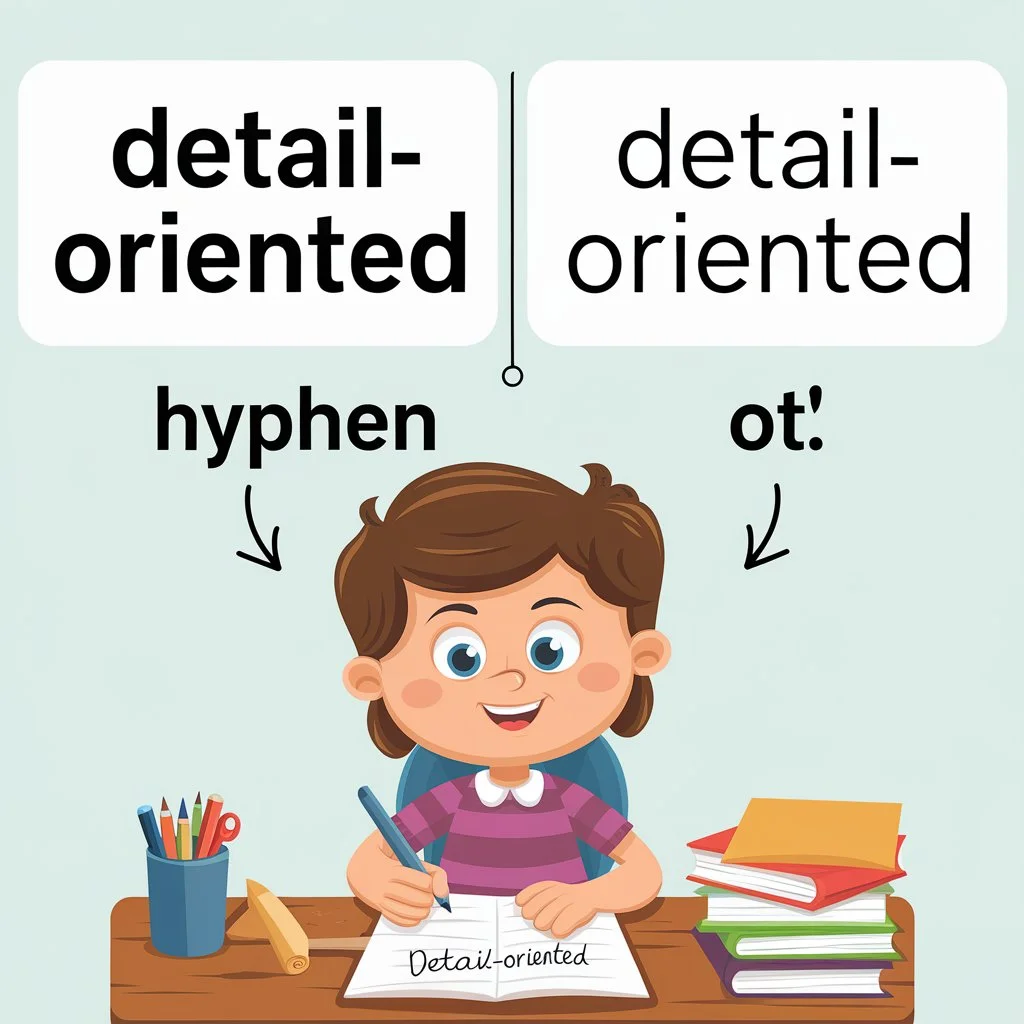There are a few things in English that can be challenging for learners over time. Hyphens are one of those common issues. Today, we’ll explore the detail-oriented hyphen rule to understand whether it’s “detail-oriented” or “detail oriented.” This explanation will help answer the common question: Is “detail-oriented” hyphenated?
Detail Oriented or Detail-Oriented – Hyphenated or Not?
You should hyphenate “detail-oriented” when you are using it to modify a noun or object in a sentence. However, you should leave it unhyphenated (as “detail oriented”) when it is not modifying a noun, instead functioning as its own noun. That being said, with the evolving nature of the English language, the unhyphenated form is gradually being phased out. Many people now expect to read “detail-oriented” in most contexts, regardless of traditional grammar rules.
Examples of When to Use “Detail Oriented”
Let’s start by discussing the unhyphenated version. Officially, it is grammatically correct to leave “detail oriented” unhyphenated when it’s used as a noun and not directly modifying an object in a sentence. However, in all the examples below, you could easily replace the unhyphenated form with the hyphenated form (“detail-oriented”), and it would still make sense to most people.
Examples
- I am very detail oriented.
- She prides herself on being detail oriented.
- We are all detail oriented in our work.
- He seems incredibly detail oriented.
- The job requires someone who is detail oriented.
- You can’t become more detail oriented overnight.
- They are detail oriented and focused on quality.
- Being detail oriented helps you avoid mistakes.
- I admire how detail oriented she is.
- He’s extremely detail oriented when it comes to his projects.
- A detail oriented person will excel in this task.
- You need to be more detail oriented in your reports.
- Our team is known for being detail oriented.
- She’s naturally very detail oriented.
- The company prefers detail oriented candidates.
- He’s become more detail oriented with experience.
- Her detail oriented approach makes her successful.
- I wasn’t always this detail oriented.
- A detail oriented mind is key to solving complex problems.
- If you’re not detail oriented, you’ll miss important points.
- He was praised for being so detail oriented.
- This position is perfect for someone who is detail oriented.
- Her detail oriented nature ensures nothing is overlooked.
- They want detail oriented individuals on the team.
- I try to stay as detail oriented as possible.
- Being detail oriented can save a lot of time in the long run.
- I’ve been working on becoming more detail oriented.
- Her detail oriented personality is an asset in this field.
- People who are detail oriented are often more organized.
- We value detail oriented employees who ensure accuracy.
Examples of When to Use “Detail-Oriented”
The most common way to write it is by including the hyphen. Even in the examples listed above, people often prefer to see the hyphen between “detail” and “oriented.” If you are using “detail-oriented” on a resume or CV, it’s always a good idea to hyphenate it. You’ll never be wrong if you follow this rule.
Examples
- He is a detail-oriented person.
- This is a detail-oriented job role.
- We need a detail-oriented candidate for this position.
- She has a detail-oriented mindset.
- Being a detail-oriented manager helps improve team efficiency.
- This task requires someone with a detail-oriented approach.
- He is well-known for his detail-oriented work ethic.
- A detail-oriented employee is always appreciated.
- You should be more detail-oriented in this project.
- She holds a detail-oriented position in the company.
- Our detail-oriented strategy ensures fewer mistakes.
- A detail-oriented analysis is crucial for this report.
- The company needs a detail-oriented auditor.
- He provided a detail-oriented explanation.
- They are hiring a detail-oriented administrative assistant.
- Her detail-oriented personality shines in her work.
- This detail-oriented plan will cover all potential risks.
- He leads a detail-oriented research team.
- A detail-oriented design will catch every small flaw.
- Her detail-oriented review helped improve the final product.
- This is a detail-oriented position in our organization.
- A detail-oriented approach can prevent costly errors.
- The detail-oriented report was well-received by the board.
- His detail-oriented analysis improved the project’s outcome.
- They expect a detail-oriented response to this request.
- The detail-oriented work style has become her trademark.
- A detail-oriented editor will spot any grammatical errors.
- The detail-oriented instructions were easy to follow.
- A detail-oriented inspection of the equipment is mandatory.
- She has been praised for her detail-oriented leadership.
Is “Detail Oriented” Hyphenated in AP Style?
In AP Style, hyphenated words are typically considered compound words that are closely linked. These hyphens create a connection between words to better explain their meaning, especially when used to modify nouns or objects in sentences. If there’s no noun or object being modified, then the hyphen isn’t needed. This means that when no object follows, you can leave “detail oriented” without the hyphen.
Should I Capitalize “Oriented” in “Detail-Oriented”?
If you’re confused about hyphenation, you might be even more confused about capitalization in titles. Different style guides offer seemingly contradictory rules regarding title capitalization, especially when it comes to hyphenated words.
The truth is, capitalization depends on your personal style or the specific style guide you follow. Some people like to capitalize only the first word of a title and any proper nouns. In this case, “oriented” would remain lowercase in “detail-oriented.”
Others prefer to capitalize every major word in a title, excluding articles, short conjunctions, and short prepositions. In this case, you would capitalize “detail” but leave “oriented” lowercase, since it’s a continuation of the first word.
Lastly, there is a growing style in which every word is capitalized, meaning both “Detail” and “Oriented” would be capitalized no matter what. This style is simple and easy to remember.
Alternatives to “Detail-Oriented”
If you’d rather avoid the hyphenation rules altogether, you can always use an alternative word. Finding a synonym is a great way to avoid worrying about whether you need a hyphen. Here are some of the best alternatives for “detail-oriented”:
- meticulous
- exact
- rigorous
- analytical
- perfectionist
Quiz – Detail Oriented or Detail-Oriented?
Now that we’ve covered all the language rules related to hyphenation, it’s time to test your skills! Here’s a short quiz to see if you’ve mastered the correct usage. Choose the correct answer and see how well you understand:
- I am a (A. detail oriented / B. detail-oriented) person.
- We are all (A. detail oriented / B. detail-oriented) here.
- This is a (A. detail oriented / B. detail-oriented) position.
- I’ve never met someone more (A. detail oriented / B. detail-oriented).
- I have a (A. detail oriented / B. detail-oriented) job.
Quiz Answers
- B
- A
- B
- A
- B
FAQs
What is a detail-oriented person?
A detail-oriented person pays attention to small things and ensures everything is done perfectly. They focus on accuracy and try to avoid mistakes. This quality is especially helpful in jobs that require precision.
Why is being detail-oriented important?
Being detail-oriented helps in producing high-quality work. It prevents errors and ensures that every part of a task is done properly. This is important in jobs like accounting, design, or project management.
How can I become more detail-oriented?
To be more detail-oriented, focus on each part of a task carefully. Break tasks into smaller steps and double-check your work. Developing routines and minimizing distractions also help.
Is detail-oriented a skill?
Yes, detail-oriented is considered a valuable skill in many fields. Employers often look for this skill in roles that require precision, organization, and attention to detail. It shows that you can handle tasks thoroughly.
What is another word for detail-oriented?
Some other words for detail-oriented are meticulous, precise, thorough, and analytical. These all describe people who pay close attention to details and accuracy.
Can being too detail-oriented be a bad thing?
Sometimes, being too detail-oriented can slow down work or cause unnecessary stress. It’s important to balance focusing on details with meeting deadlines. Being flexible can help in managing time better.
Is detail-oriented the same as organized?
While both are important, being detail-oriented means focusing on small parts of a task, while being organized means having everything planned and structured. Someone can be organized but may miss small details, and vice versa.
What jobs require a detail-oriented person?
Jobs like accounting, graphic design, engineering, and editing require a detail-oriented person. In these jobs, small mistakes can lead to big problems, so attention to detail is crucial.
Final Words
In conclusion, being detail-oriented is a highly valuable skill that enhances accuracy and quality in any task. It helps prevent errors and ensures that work is done thoroughly, making it essential in various professions. While it’s important to maintain a balance to avoid over-focusing on details, developing a detail-oriented mindset can greatly improve performance and productivity in the long run.

I’m Mira Sinclair, the expert helping you navigate grammar sections at “Grammer Grove.” Playing with words and expressions is my thing. At Grammer Grove, we’re here to make yourwriting stand out and shine. Let’s make your appreciation heartfelt and memorable—come and join the fun at Grammer Grove!












